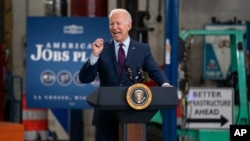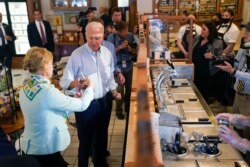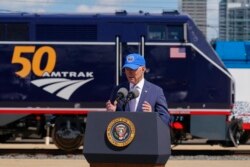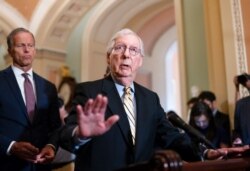Bringing affordable and high-speed internet service to every American would be equivalent to the federal government’s rural electrification project of the 1930s, according to President Joe Biden.
“It set the stage for a massive, sustained economic boom that would follow World War Two,” Biden, in Wisconsin, said Tuesday of the New Deal policy of the Franklin Roosevelt presidency.
Broadband internet “isn’t a luxury. It's now a necessity, like water and electricity,” the president remarked in his latest speech outside Washington to push for congressional passage of a bipartisan $1.2 trillion infrastructure package.
The package is intended to boost blue-collar employment by creating “good paying jobs, repairing our roads and our bridges,” said Biden at the Municipal Transit Utility in La Crosse, Wisconsin.
The White House emphasizes that 90% of the jobs generated by the infrastructure spending could go to workers without college degrees.
The compromise legislative package was negotiated last week with a group of 10 centrist U.S. senators, five Republicans and five Democrats. It includes the largest investment in public transit in history, according to the White House. It also is intended to construct a nationwide network of electric vehicle chargers and eliminate lead service lines and pipes.
A White House memo said the construction package is four times the size of the infrastructure investment adopted after the Great Recession of 2008-2009 and the biggest since the Depression of the 1930s spawned by Roosevelt’s massive New Deal spending.
The package includes the largest investment in passenger rail services since the creation of the country’s Amtrak system. In Wisconsin alone, the White House said, the measure would help repair 979 bridges and more than 3,100 kilometers of highways in poor condition.
Biden’s push for adoption of the infrastructure package had a rocky start last week after he announced it jointly with the bipartisan group of lawmakers.
The president told reporters he would reject the package if Congress did not also approve trillions of dollars in new social spending legislation that he wants to aid families and advance clean energy — items adamantly opposed by most Republican lawmakers.
On Saturday, Biden said his comments had “created the impression that I was issuing a veto threat on the very plan I had just agreed to, which was certainly not my intent.”
Walking back the infrastructure veto threat, Biden said he wholeheartedly supports both the bipartisan infrastructure package and the still-developing social spending legislation, while recognizing Republicans would try to defeat the so-called “human infrastructure” legislation.
If Congress eventually approves the social safety legislation, it could be that only Democratic lawmakers will vote for it.
The president looks forward to signing “both bills into law and he will leave it to leaders in Congress to determine the order and the sequencing,” White House Press Secretary Jen Psaki told reporters on Tuesday’s Air Force One flight to Wisconsin.
Senate Minority Leader Mitch McConnell, on Monday, said the president “has appropriately delinked a potential bipartisan infrastructure bill from the massive, unrelated tax-and-spend plans that Democrats want to pursue on a partisan basis.”
The Republican said he now wanted Biden to engage with the Democratic Party’s leaders in the Senate and House to “make sure they follow his lead."
The White House, on Tuesday, touted a new Yahoo/YouGov poll showing 51% of U.S. adults supporting the bipartisan infrastructure agreement and 60% of Republicans indicating they back the plan.
Some observers express confidence the compromise will hold after the clarifications from Biden and repeated assurances that the two bills will proceed on different tracks.
“The argument about linking the bipartisan agreement to future legislation must be understood in the context of this competition among priorities. The president has appropriately clarified that he is committed to pursuing his full agenda but will not condition the success of one component upon the other,” said Jason Grumet, founder and president of the Bipartisan Policy Center.
Biden “has been an effective legislator for 30 years and recognizes that ‘all or nothing politics’ produces a predictable result, and it is not ‘all,’” said Grumet.
Climate activists, meanwhile, are expressing concern that the president is abandoning campaign pledges concerning global warming in order to cut a deal with opposition lawmakers.
A group of protesters rallied near the White House on Monday.
"Sometimes folks need a little reminder of the community that took them to the dance," Alexandria Ocasio-Cortez, a Democratic member of Congress from New York, told the demonstrators. “We’re inviting the White House to the dance."








